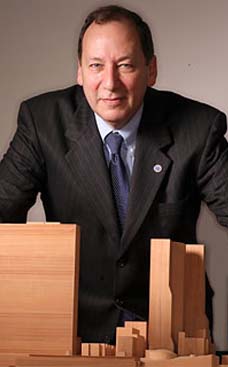
Overall, the trip was discouraging. Our best memories were with the individuals we encountered along the way. Meeting with teachers at the schools, buying water on the road or talking with merchants in the markets, people seemed resigned about politics yet persevering and buoyant in their everyday lives. We found the same irrepressible spirit in the streets that we encountered four decades ago. We were welcomed warmly by those who remembered us. One volunteer was greeted by a parade and a band in appreciation of the contributions she had made during her time there. Another took a side trip to stay with a student whose education he had sponsored. A former student of mine felt that I had inspired students to reach for more and gave them a larger view of the world. One of the government ministers touched us all when he said, "It was my Peace Corps teacher who motivated me to improve myself and see the value of education."
Robert P. Cristo writes: I was one of 21 former Peace Corps volunteers who recently returned to Nigeria to assess the current state of the country and to see if the Peace Corps had any impact there
The Peace Corps:
Sunday, January 04, 2009
BY ROBERT P. CRISO
I was one of 21 former Peace Corps volunteers who recently returned to Nigeria to assess the current state of the country and to see if the Peace Corps had any impact there. We were all there in the '60s and some remembered getting the news that John Kennedy, Martin Luther King or Bobby Kennedy was shot. Now we were all in our 60s, still adventurous and waiting for news about the possible election of an African-American president back home.
Arriving in Lagos, we were hit by the same wall of heat and humidity we felt the first time we arrived. The acrid smell from the open sewers and the bustling street scenes were familiar, but the city that we previously roamed with ease had changed. Urban sprawl was exponentially greater, good hotel rooms were $500 or more, the streets were too dangerous to walk and gridlock was the norm. Unlike other West African countries, there was no developed infrastructure for tourism. The dark and dusty Nigerian National Museum looked unused. The national railway, a vital artery back then, was no longer running.
We were on the front pages and the evening news. We met with government ministers and the American consul, were briefed about the latest economic and political developments. Despite the diplomatic spin, the news was generally grim. The director of security, who looked like a defensive lineman for the Dallas Cowboys, warned us, "Don't travel without armed guards and never travel at night." He told us about the robberies on the road and the kidnappings in the Niger delta. The Peace Corps had pulled out of Nigeria in 1970 because of security concerns.
As we traveled around the country, some primary roads were barely passable and therefore time-consuming to navigate. We were warned about thieves who lurked in the bush, waiting to ambush a vehicle struggling to traverse the muddy potholes. Poorly paid soldiers carrying automatic weapons randomly stopped vehicles at roadblocks and asked for bribes or food. We made it without incident but realized the necessity of the armed guards who escorted us.
We met with the three main traditional tribal leaders, who still wield a tremendous amount of power even though Nigeria is technically a democracy. Invitations to the palaces of the Emir of Kano, the Igwe of Enugu and the Oba of Ibadan were like getting a private audience with the pope. The opulence of these settings was a startling contrast to the grinding poverty we saw on the streets.
It was interesting to be in Africa during the American election. In the conservative north, one teacher, in a long white robe and Muslim cap, stepped forward during a discussion and said, "We want to love America again. McCain may be a good man, but he wants to lead the country. Obama can lead the world." When the election was decided, the country was jubilant. "Obama!" replaced "Hello" whenever we encountered people in the streets or markets. "He gives us hope," a vendor told me.
Hope is all that many people have to hold onto. Nigeria is consistently listed as one of the 20 poorest and most corrupt countries in the world. After its independence in 1960, it was seen as the most promising democracy in Africa, but it has failed to come close to its potential despite tens of billions of dollars in oil revenues. Seventy percent of the population lives on one or two dollars a day.
Overall, the trip was discouraging. Our best memories were with the individuals we encountered along the way. Meeting with teachers at the schools, buying water on the road or talking with merchants in the markets, people seemed resigned about politics yet persevering and buoyant in their everyday lives. We found the same irrepressible spirit in the streets that we encountered four decades ago.
We were welcomed warmly by those who remembered us. One volunteer was greeted by a parade and a band in appreciation of the contributions she had made during her time there. Another took a side trip to stay with a student whose education he had sponsored. A former student of mine felt that I had inspired students to reach for more and gave them a larger view of the world. One of the government ministers touched us all when he said, "It was my Peace Corps teacher who motivated me to improve myself and see the value of education."
So, what did we conclude about the current state of the country? It was only a cursory view, but things seemed worse. Two weeks after we returned, four hundred people were killed when religious and tribal violence broke out. It was the same issue that led to the civil (Biafran) war in 1967-1970, when up to 3 million people were killed.
Did we have any impact? Yes, but maybe not in the way we thought. Clearly, we had inspired some individuals, but maybe it was not the kind of concrete change we envisioned when we arrived. Our success seemed more in what we instilled than what we built. Our ambassadorial roles may have transcended our job functions.
I think that what changed the most was us. For many of us, the Peace Corps was a defining moment that altered our lives thereafter. It changed the way we understood the world, America and ourselves. We brought it back home in the way we chose careers and influenced others. I don't think it would have happened if we hadn't been inspired ourselves by John F. Kennedy and took the risk of immersing ourselves in a foreign culture. We went to teach, and learned. We went to change, and returned indelibly different.
A writer and world traveler, Robert Criso is a counselor at Princeton University Health Services. He also has a private psychotherapy practice in Princeton. He lived in Nigeria and Somalia while serving in the Peace Corps.













